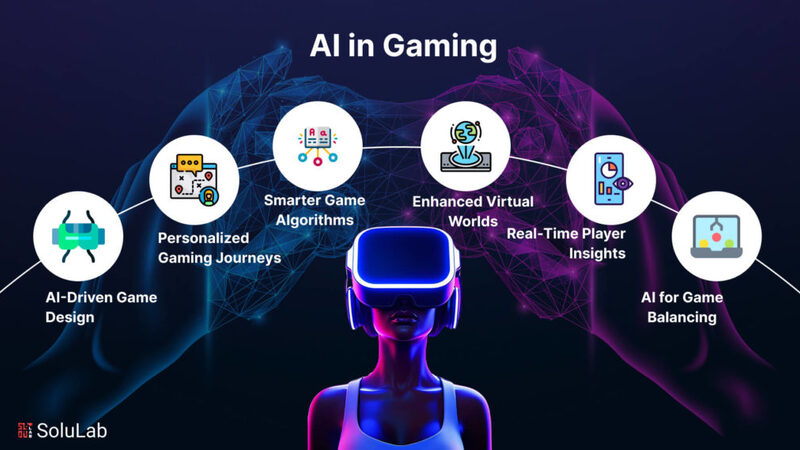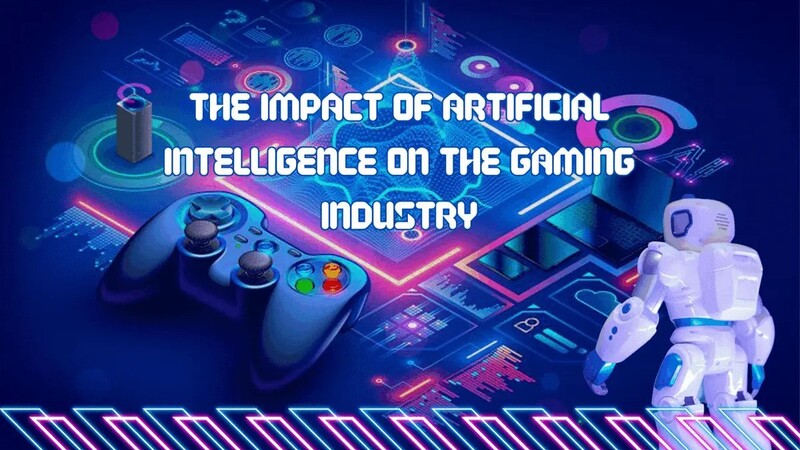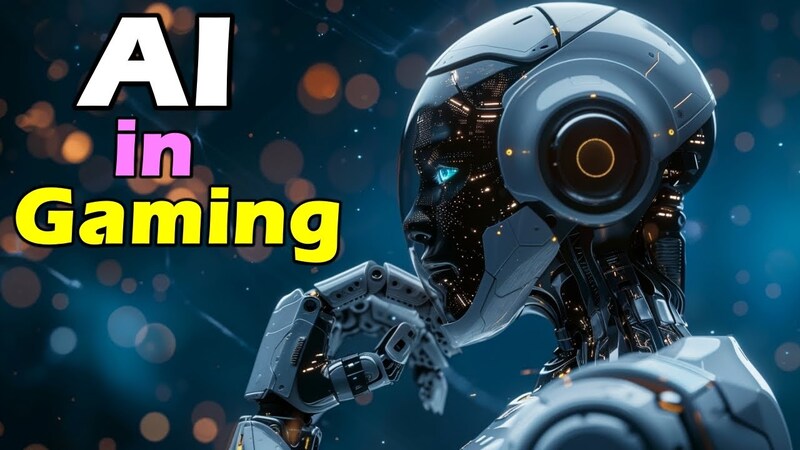Artificial Intelligence (AI) has become an integral part of the gaming industry, revolutionizing everything from game design and development to gameplay mechanics and player interactions. While AI offers a range of benefits, its increasing involvement also raises ethical and creative concerns. The question remains: Is AI in gaming a force for good, or does it pose significant risks to the industry and players?
The Positive Impact of AI in Gaming

Enhanced Game Development
AI streamlines game development by automating time-consuming tasks such as level design, bug testing, and asset creation. Procedural generation, powered by AI, allows developers to create vast and dynamic game worlds efficiently. For example, games like No Man’s Sky use AI-driven algorithms to generate billions of unique planets, making exploration a limitless experience.
Beyond procedural generation, AI-powered tools assist developers in optimizing game performance and debugging errors. AI can predict potential bugs before they occur, significantly reducing development time and improving overall game stability. AI-driven animation techniques also allow characters and environments to move and interact more fluidly, lifelike without requiring extensive manual animation work.
Smarter NPCs and More Immersive Gameplay
Traditional non-player characters (NPCs) often follow predictable patterns, making them feel robotic and unresponsive. AI has changed that by enabling NPCs to learn, adapt, and make decisions based on player behavior. Games like The Last of Us Part II feature enemies with advanced AI that communicate with each other, flank players strategically, and react to environmental changes dynamically, creating more immersive and challenging gameplay.
AI-driven NPCs also improve storytelling. In games like Red Dead Redemption 2, AI allows NPCs to have daily routines, react believably to player actions, and even remember past interactions. This level of sophistication enhances world-building and makes game environments feel truly alive.
Personalized Player Experiences
AI-driven adaptive difficulty ensures that games remain engaging for players of all skill levels. Some games use machine learning to analyze playstyles and adjust mechanics in real time. For example, the Alien: Isolation AI learns from player behavior to make the Xenomorph a more unpredictable and terrifying foe.
Beyond difficulty adjustments, AI also enhances customization. In RPGs, AI can analyze dialogue choices and gameplay behavior to create more personalized narratives. Some AI-powered systems even allow procedural dialogue generation, ensuring that players encounter fresh and unique interactions each playthrough. Games like Middle-earth: Shadow of War utilize AI-driven systems such as the Nemesis System, where enemy characters remember past battles and evolve based on the player’s actions.
Realistic Graphics and Animations
AI is being used to create ultra-realistic animations, facial expressions, and voice synthesis. NVIDIA’s AI-driven DLSS (Deep Learning Super Sampling) technology improves frame rates and image quality, allowing gamers to experience photorealistic visuals without requiring top-tier hardware.
Moreover, AI-powered tools help developers create lifelike character animations using motion capture data with minimal manual refinement. AI-based voice synthesis also allows for realistic voice acting without requiring human voice actors for every minor character or line of dialogue. This technology has the potential to make open-world games richer with diverse NPC conversations and interactions.
AI-Assisted Game Balancing
AI can analyze vast amounts of gameplay data to assist developers in balancing in-game mechanics. AI-driven analytics allow developers to detect overpowered weapons, unfair difficulty spikes, and exploitative strategies that could break a game’s competitive integrity. This is particularly valuable in online multiplayer games, where balance is crucial for maintaining fairness and keeping the player base engaged. Games like League of Legends and Overwatch rely on AI-generated insights to adjust character abilities and ensure a fair playing field.
The Downsides of AI in Gaming

Loss of Creativity and Human Touch
One of the biggest concerns is the risk of AI replacing human creativity. While AI can generate assets, storylines, and dialogue, it lacks the emotional intelligence, cultural context, and originality of human developers. There is a fear that AI-created content might lead to generic or repetitive gaming experiences.
For instance, AI-generated narratives may lack the nuanced storytelling that makes games emotionally impactful. Games that rely too heavily on AI for dialogue generation may struggle with delivering meaningful character development or unique storytelling elements. If AI tools become the primary means of content creation, there is a risk that the gaming industry could lose the artistic touch that makes games compelling.
Dependence on AI and Reduced Developer Oversight
As AI becomes more integrated into game development, there is a risk that developers may rely too heavily on automated processes, reducing the level of hands-on creative oversight. Overdependence on AI could lead to homogenized game design, where procedural generation and machine learning dictate most aspects of game development rather than intentional, handcrafted design. This could result in games feeling less personal and unique, diminishing the artistry that makes gaming a compelling medium.
Ethical Concerns and Job Displacement
This is a major one, that worries me a bit. Being that I’ve been a union steward since 2017, I’ve dealt with job displacement for people and the impact of it. As AI takes over tasks traditionally performed by human developers, there are concerns about job displacement in the gaming industry. AI-generated voice acting, artwork, and even code could lead to reduced opportunities for human artists, writers, and programmers.
Additionally, AI-generated assets could raise copyright and ethical concerns. If an AI model is trained on existing human-created artwork or scripts, it may unintentionally replicate or plagiarize elements from previous works, leading to legal disputes over ownership and originality. The use of AI-generated voice acting has also been criticized for potentially undermining professional voice actors, reducing opportunities for skilled performers.
Microtransactions and AI-Driven Monetization
AI is being used to analyze player habits and optimize in-game monetization. While this can enhance engagement, it also raises concerns about predatory practices. AI-driven microtransactions can be designed to exploit player psychology, encouraging excessive spending. For example, AI can track player behavior and tailor in-game purchase prompts at moments when a player is most likely to make a purchase, such as after a close defeat. Some mobile and free-to-play games utilize AI-driven pricing models, adjusting the cost of microtransactions based on an individual player’s spending habits. This raises concerns about the ethical implications of AI-driven monetization and its impact on vulnerable players, particularly younger audiences.
AI Bias and Unpredictability
AI systems can sometimes reflect biases present in their training data, leading to problematic game design choices. For example, an AI-generated character creation tool could unintentionally reinforce stereotypes if not carefully monitored. AI-driven decision-making in games may also unintentionally exclude certain player choices or create unbalanced gameplay elements.
Additionally, AI behavior in games can be unpredictable, leading to immersion-breaking glitches or unintended consequences that affect the gaming experience. While AI-powered NPCs are designed to be smarter, they can sometimes exhibit erratic or nonsensical behaviors, breaking immersion rather than enhancing it. AI systems must be thoroughly tested and refined to ensure they improve gameplay rather than disrupt it.
Final Thoughts
So the question we come back to is AI in gaming ultimately good or bad? AI in gaming is a double-edged sword. On one hand, it enhances development efficiency, provides smarter NPC interactions, and enables stunning visual experiences. On the other hand, it raises concerns about job security, ethical practices, and the loss of human creativity. Rather than viewing AI as inherently good or bad, the key lies in responsible implementation. Developers should use AI to enhance human creativity rather than replace it. AI should serve as a tool to support innovation while ensuring ethical considerations are met.
Striking the right balance between automation and human artistry will determine the future of AI in gaming. If used responsibly, AI has the potential to elevate gaming to new heights while preserving the industry’s creative and ethical integrity. If I could experience a VR world as realistic as Sword Art Online, I’d be ecstatic. But I would never want something like that at the cost of others. AI should complement human creativity, not replace it. Let me know what you all think!


2 comments
[…] The gaming industry has undergone a profound transformation in recent years. Each striving to become a more inclusive space for players and developers alike. Diversity, Equity, and Inclusion (DEI) initiatives have taken center stage, influencing character representation, game narratives, workplace culture, and community engagement. These efforts aim to ensure that gaming is accessible and welcoming to individuals from all backgrounds. While progress has been made, challenges remain, sparking ongoing discussions about the effectiveness and future of DEI in gaming. […]
[…] gaming industry continues to evolve. We get to experience breathtaking advancements in graphics, AI-driven experiences, and virtual reality. Yet, despite these innovations, we continue to see a surprising trend. That […]
Comments are closed.